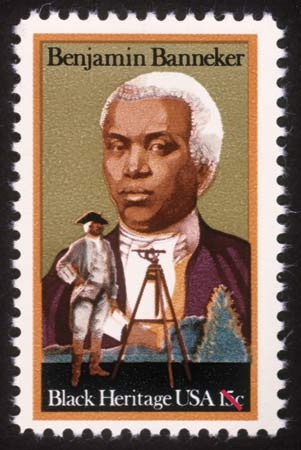Banneker, Benjamin
American scientist
born Nov. 9, 1731, Ellicott's Mills, Md.
died Oct. 25, 1806, Baltimore, Md., U.S.
 mathematician, astronomer, compiler of almanacs, inventor, and writer, one of the first important black American intellectuals.
mathematician, astronomer, compiler of almanacs, inventor, and writer, one of the first important black American intellectuals.A free black who owned a farm near Baltimore, Banneker was largely self-educated in astronomy by watching the stars and in mathematics by reading borrowed textbooks. In 1761 he attracted attention by building a wooden clock that kept precise time. Encouraged in his studies by a Maryland industrialist, Joseph Ellicott, he began astronomical calculations about 1773, accurately predicted a solar eclipse in 1789, and published annually from 1791 to 1802 the Pennsylvania, Delaware, Maryland, and Virginia Almanac and Ephemeris. Appointed to the District of Columbia Commission by President George Washington in 1790, he worked with Andrew Ellicott and others in surveying Washington, D.C.
As an essayist and pamphleteer, Banneker opposed slavery and war. He sent a copy of his first almanac to Thomas Jefferson (Jefferson, Thomas), then U.S. secretary of state, along with a letter asking Jefferson's aid in bringing about better conditions for American blacks. Banneker's almanacs were acclaimed by European scientists to whom Jefferson made them known.
- Acciaiuoli, Niccolò
- accidental
- accipiter
- accismus
- Accius, Lucius
- acclimatization
- accompaniment
- accomplice
- Accoramboni, Vittoria
- accordion
- accounting
- account payable
- account receivable
- Accra
- acculturation
- Accursius, Franciscus
- accused, rights of
- AC/DC
- Ace, Goodman
- Aceh
- Acehnese
- Acehnese War
- acervulus
- Acestes
- Acetabularia